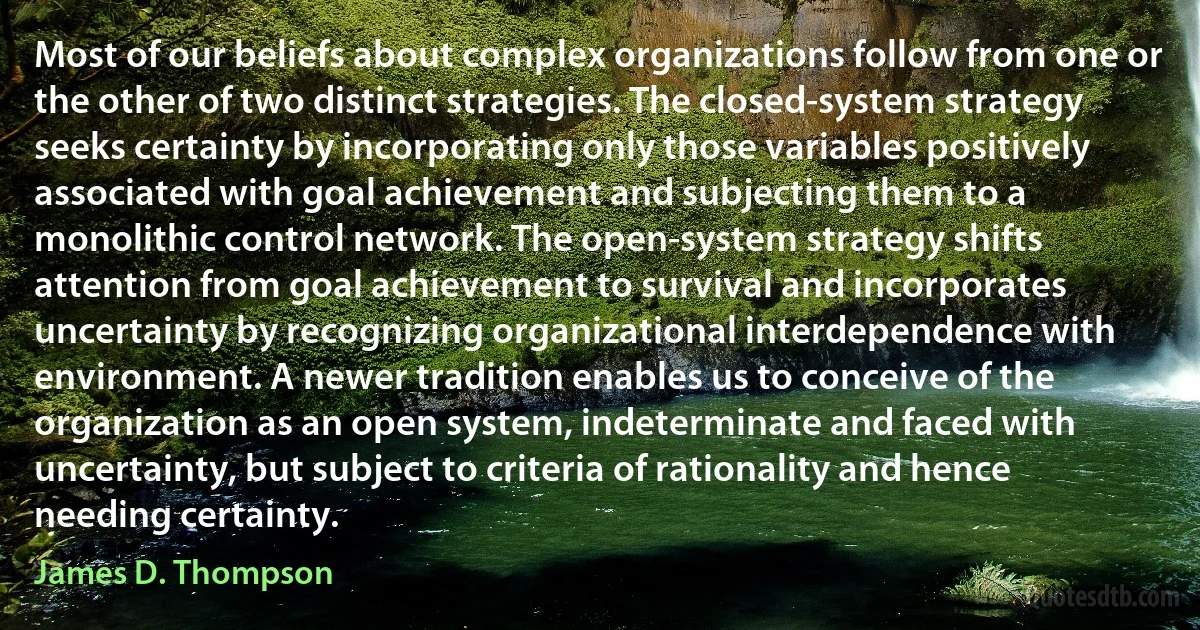
Most of our beliefs about complex organizations follow from one or the other of two distinct strategies. The closed-system strategy seeks certainty by incorporating only those variables positively associated with goal achievement and subjecting them to a monolithic control network. The open-system strategy shifts attention from goal achievement to survival and incorporates uncertainty by recognizing organizational interdependence with environment. A newer tradition enables us to conceive of the organization as an open system, indeterminate and faced with uncertainty, but subject to criteria of rationality and hence needing certainty.
James D. ThompsonRelated topics
attention certainty complex control criterion follow indeterminate interdependence needing network open organizationRelated quotes
The advanced arithmetical machines of the future will be electrical in nature, and they will perform at 100 times present speeds, or more.
Moreover, they will be far more versatile than present commercial machines, so that they may readily be adapted for a wide variety of operations. They will be controlled by a control card or film, they will select their own data and manipulate it in accordance with the instructions thus inserted, they will perform complex arithmetical computations at exceedingly high speeds, and they will record results in such form as to be readily available for distribution or for later further manipulation.

Vannevar Bush
One of the most important axioms is, that as the quantity of any commodity, for instance, plain food, which a man has to consume, increases, so the utility or benefit derived from the last portion used decreases in degree. The decrease in enjoyment between the beginning and the end of a meal may be taken as an example. And I assume that on an average, the ratio of utility is some continuous mathematical function of the quantity of commodity. This law of utility has, in fact, always been assumed by political economists under the more complex form and name of the Law of Supply and Demand. But once fairly stated in its simple form, it opens up the whole of the subject.

William Stanley Jevons
Capital, explaining the origins of the capitalist mode of production, points towards the inevitable historical decline and fall of this same social system. An economic theory based upon the historical relativity of every economic system, its strict limitation in time, tactlessly reminds Messrs the capitalists, their hangers-on and their apologists that capitalism itself is a product of history. It will perish in due course as it once was born. A new social form of economic organization will then take the place of the capitalist one: it will function according to other laws than those which govern the capitalist economy.

Ernest Mandel
I find it nearly impossible free ice to write about jeep axle my work. The concept I plantatarium struggle to deal with ketchup is opposed to the logical continuity lift tab inherent in language horses and communication. My fascination with images open 24 Hrs. is based on the complex interlocking of disparate visual facts heated pool that have no respect for grammar. The form then Denver 39 is second hand to nothing. The work then has a chance to electric service become its own cliche. Luggage. This is the inevitable fate fair ground of any inanimate object Freight-ways by this, I mean anything that does not have inconsistency as a possibility built-in..

Robert Rauschenberg
Some students of philosophy have unreasonably high expectations of the subject. They expect it to provide them with a complete and detailed picture of the human predicament. They think that philosophy will reveal to them the meaning of life, and explain to them every facet of our complex existences. Now, although studying philosophy can illuminate fundamental questions about our lives, it does not provide anything like a complete picture, if indeed there could be such a thing. Studying philosophy isn't an alternative to studying art, literature, history, psychology, anthropology, sociology, politics, and science.

Nigel Warburton
